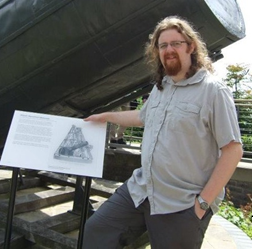The Ten Minute Interview is a feature we will run regularly as part of our blog.
Dan and I feel passionate about promoting the work of Early Career Researchers (ECRs) and also all the people behind the scenes who actually make research happen. The unsung heroes of our labs if you like; technicians and support staff. The key idea is that it shouldn’t take long to read these interviews, you should have enough time to do so whilst you drink your morning coffee or have a quick tea break in the afternoon. The interviewees details are at the bottom of all the posts, so if you find the person particularly interesting, get in touch with them!
Kicking off the ten minute interview feature is Elliot Hurst, one of our lab technicians at the Geomagnetism Laboratory at Liverpool University. Elliot has helped me out with a lot of my research, particularly all the fiddly bits associated with the instruments I use. I should say he is very patient with me and has dug me out of a hole a fair number of times!
Vital Statistics
- You are: Elliot Hurst (elliot.hurst@liv.ac.uk)

- You work at: University of Liverpool Geomagnetism Laboratory
- Your role is: Laboratory research technician
Q1) What are you currently working on? I work simultaneously on a variety of different projects, depending on the demands of the lab and the main ongoing research at the time. Currently my time is split between carrying out microwave palaeointensity experiments on pottery sherds from the south west Pacific islands and cataloguing, sampling and measuring magnetic remanences on a collection of rhyolites and basalts I helped drill from Scotland.
Q2) What is a typical day like for you? I normally spend most of time using several of the machines in the lab, measuring magnetic remanences or various magnetic properties in different rock or pottery samples. The rest of my time is divided up amongst making small repairs on the lab equipment, preparing samples for measuring and training visitors and students in the operation of our machines.
Q3) Does your job allow you to have any academic outputs? In a way, yes. While I don’t write papers myself, the majority of the work I do in the lab contributes significantly to the results shown in papers, and in the next couple of years I am hoping to have my work included in several of them.
Q4)What has been the highlight of your career so far? I’d probably have to say when I went to Lincolnshire, digging up part of an early Iron Age site. We were involved in helping trying to date the site using archaeomagnetic techniques, and our results may show that the site is one of the earliest examples of iron workings in Britain. I’m really looking forward to see where my career takes me in the next few years though. It’s early days yet!
Q5) To what locations has your research taken you and why? I mostly just live in the lab, but I have been to Lincolnshire for a quick excavation of an early Iron Age site, and I recently went to Scotland to help take rock cores from a number of outcrops.
Q6) Do you have one piece of advice for anyone wanting to have a career similar to yours? Keep in contact with your teaching staff after you graduate university. I would never have known that my position was available unless my lecturers were easily able to contact me.
Q7) If you could invent an element, what would it be called and what would it do? Netherrack from the game “Minecraft”. I know I’m not inventing it as such, but it would be awesome to have a material in the real word that could burn indefinitely!
I am originally from Ramsbottom in Lancashire, and I came to Liverpool in 2006 as an undergraduate student studying geophysics. Once I graduated, I worked for a year in a customer service centre before starting working for the Geomagnetism Group in 2011. In my spare time I enjoy hanging out with friends, playing computer games, and spending time outdoors.
